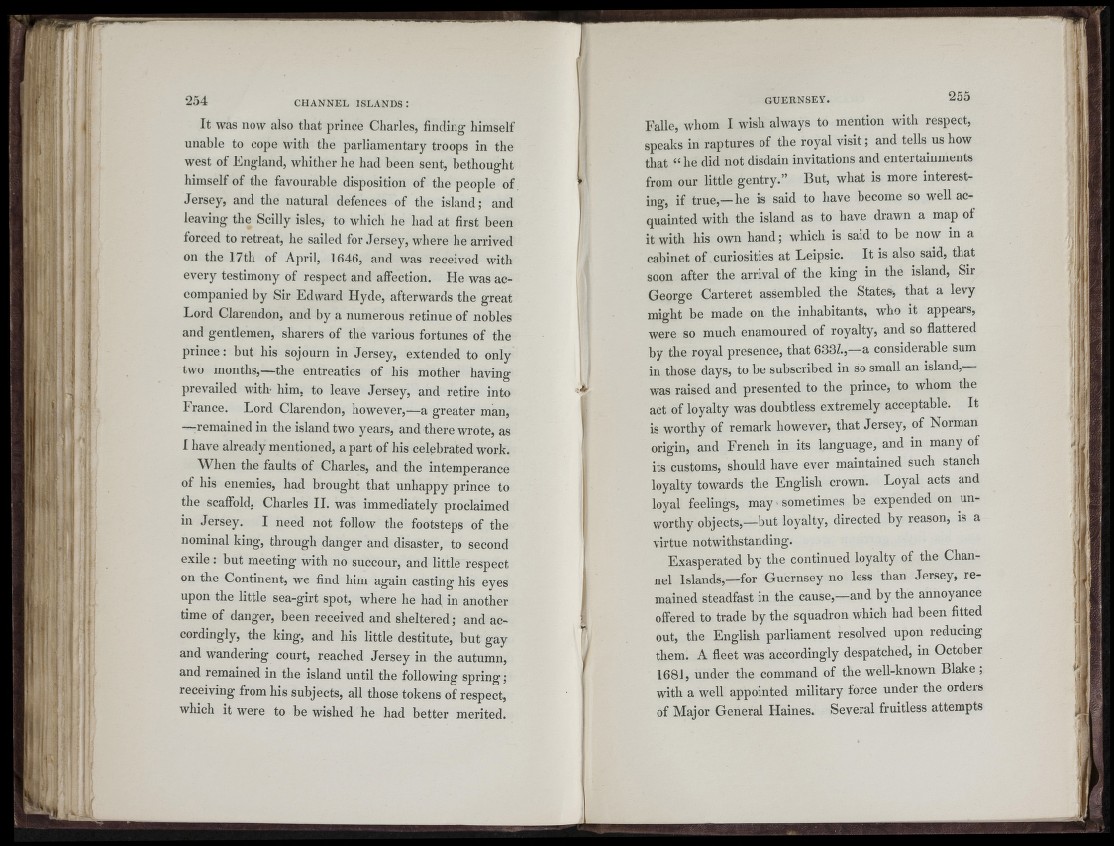
■J i
E H i i
fii
ff
[hi Et
[Sli
IFua
’ 1 1
E ! ■
. i f
s i ;
■iv -u - li i
f
f i ' i ,
ii -n
=S " i i
2 5 4 CHANNEL ISLANDS :
It was now also that prince Charles, finding himself
unable to cope with the parliamentary troops in the
west of England, whither he had been sent, bethought
himself of the favourable disposition of the people of
Jersey, and the natural defences of the island; and
leaving the Scilly isles, to which he had at first been
forced to retreat, he sailed for Jersey, where he arrived
on the 17th of April, 1646, and was received with
every testimony of respect and affection. He was accompanied
by Sir Edward Hyde, afterwards the great
Lord Clarendon, and by a numerous retinue of nobles
and gentlemen, sharers of the various fortunes of the
prince: but his sojourn in Jersey, extended to only
two months,—the entreaties of his mother having
prevailed with- him, to leave Jersey, and retire into
France. Lord Clarendon, however,—a greater man,
—remained in the island two years, and there wrote, as
I have already mentioned, a part of his celebrated work.
When the faults of Charles, and the intemperance
of his enemies, had brought that unhappy prince to
the scaffold, Charles II. was immediately proclaimed
in Jersey. I need not follow the footsteps of the
nominal king, through danger and disaster, to second
exile: but meeting with no succour, and little respect
on the Continent, we find him again casting his eyes
upon the little sea-girt spot, where he had in another
time of danger, been received and sheltered; and accordingly,
the king, and his little destitute, but gay
and wandering court, reached Jersey in the autumn,
and remained in the island until the following spring;
receiving from his subjects, all those tokens of respect,
which it were to be wished he had better merited.
Ii
V
GUERNSEY. 255
Falle, whom I wish always to mention with respect,
speaks in raptures of the royal visit; and tells us how
that “ he did not disdain invitations and entertainments
from our little gentry.” But, what is more interesting,
if true,—he is said to have become so well acquainted
with the island as to have drawn a map of
it with his own hand; which is said to be now in a
cabinet of curiosities at Leipsic. It is also said, that
soon after the arrival of the king in the island. Sir
George Carteret assembled the States, that a levy
might be made on the inhabitants, who it appears,
were so much enamoured of royalty, and so flattered
by the royal presence, that 633/.,—a considerable sum
in those days, to be subscribed in so small an island,
was raised and presented to the prince, to whom the
act of loyalty was doubtless extremely acceptable. It
is worthy of remark however, that Jersey, of Norman
origin, and French in its language, and in many of
its customs, should have ever maintained such stanch
loyalty towards the English crown. Loyal acts and
loyal feelings, may sometimes be expended on unworthy
objects,—but loyalty, directed by reason, is a
virtue notwithstanding.
Exasperated by the continued loyalty of the Channel
Islands,—for Guernsey no less than Jersey, remained
steadfast in the cause,—and by the annoyance
offered to trade by the squadron which had been fitted
out, the English parliament resolved upon reducing
them. A fleet was accordingly despatched, in October
1681, under the command of the well-known Blake;
with a well appointed military force under the orders
of Major General Haines. Several fruitless attempts
Ij"
I
d!
¡1